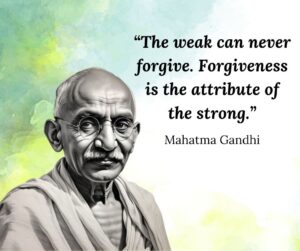Mahatma Gandhi once said, “The weak can never forgive. Forgiveness is the attribute of the strong.” In these few words, Gandhi encapsulates a profound truth about the nature of forgiveness and the inner strength required to extend it. While many perceive forgiveness as a passive act, Gandhi reminds us that it is, in fact, a powerful testament to resilience and courage. This article explores why forgiveness is a sign of strength, the benefits it brings, and how one can cultivate a forgiving heart in the face of life’s inevitable hurts.
Understanding Gandhi’s Message
Forgiveness, often misunderstood as a sign of weakness or resignation, is quite the opposite. To forgive someone requires a unique strength of character, as it involves releasing grudges, overcoming personal hurt, and rising above bitterness. Gandhi’s perspective illuminates that it is not the weak but the strong who possess the ability to forgive, as doing so demands maturity, empathy, and emotional resilience. It requires a deep well of compassion and understanding, often directed toward those who may not even seek or deserve it.
The strength of forgiveness lies in its ability to free individuals from the emotional burdens of anger, resentment, and a desire for revenge. By choosing to forgive, one demonstrates the inner fortitude to acknowledge pain, let go of animosity, and move forward positively.
Why Forgiveness is a Strength
- Conquering Inner Battles: Forgiving someone often requires grappling with one’s own emotions, memories, and disappointments. This process can be immensely difficult, as it may bring unresolved feelings to the surface. Yet, those who practice forgiveness develop the strength to process these emotions rather than letting them dictate their lives. Overcoming these inner battles is a testament to one’s resilience and capacity for self-control.
- Liberation from Resentment: Holding onto anger and resentment can become a heavy burden. By forgiving, individuals free themselves from negative emotions that can harm mental and physical health. Studies show that harboring grudges and bitterness can lead to higher stress levels, anxiety, and even physical health problems like hypertension. Choosing to forgive offers liberation from these harmful emotions, giving individuals a sense of peace and mental clarity.
- Elevating Compassion and Empathy: Forgiveness enables us to see beyond our own hurt and consider the perspective of others, cultivating empathy. This process is not easy, especially when the other person has caused significant harm. However, it reflects an understanding of human frailty—that everyone is flawed, and everyone makes mistakes. By forgiving, we can foster compassion for others’ imperfections, just as we would want them to forgive our own.
- Personal Growth and Resilience: Forgiveness fosters personal growth by forcing us to confront difficult emotions and exercise self-discipline. It builds resilience, encouraging us to become stronger rather than succumbing to despair. It also teaches us the value of letting go, enabling us to move forward with a sense of empowerment rather than victimhood.
The Benefits of Forgiveness
The decision to forgive can lead to profound transformations within oneself. Here are some of the significant benefits associated with practicing forgiveness:
- Improved Mental Health: Numerous studies have shown that forgiving others can lead to reduced stress, anxiety, and depression. When we let go of grudges and bitterness, our minds become lighter, opening up space for positive emotions.
- Enhanced Relationships: Forgiving others can strengthen relationships and improve communication. When we forgive, we open ourselves to healing and understanding, which can rebuild trust and allow us to move forward without the baggage of past conflicts.
- Increased Emotional Freedom: Forgiveness liberates us from the control that others’ actions may have over our emotions. It is a conscious decision to let go of anger and resentment, granting us the freedom to live more fully in the present moment.
- Greater Resilience: Those who practice forgiveness tend to be more resilient. They learn to process and manage difficult emotions, emerging stronger from life’s challenges and less likely to be consumed by negativity.
Steps to Cultivate Forgiveness
Forgiving is a journey that requires patience and a willingness to embrace vulnerability. Below are some practical steps to develop a forgiving mindset:
- Acknowledge the Hurt: Forgiveness doesn’t mean ignoring or minimizing the hurt we feel. Acknowledging pain is an essential step in the healing process. Recognize your emotions and accept them without judgment.
- Shift Perspectives: Try to see the situation from the perspective of the person who caused you pain. This doesn’t mean condoning their actions but can help you understand their motives or challenges. Empathy is a crucial component of forgiveness and can make it easier to let go.
- Practice Self-Compassion: Forgiveness begins with self-compassion. Be kind to yourself throughout the process, recognizing that healing takes time. Understand that forgiving others does not make you weak; rather, it empowers you by freeing you from past pain.
- Embrace Letting Go: Release the desire for revenge or retribution. Remember that forgiveness is not about seeking justice but about freeing yourself from negativity. Letting go doesn’t mean forgetting—it means choosing not to let past hurts define your future.
- Focus on the Present: Redirect your attention from past grievances to present joys and opportunities. Practicing mindfulness can help you stay rooted in the present and prevent negative thoughts from clouding your happiness.
- Seek Support: Forgiveness can be a challenging journey, and it’s okay to seek support from trusted friends, family, or even therapists. Talking about your experiences can provide relief and new perspectives on how to move forward.
Gandhi’s Vision of Forgiveness in Action
Gandhi’s life was a testament to his philosophy on forgiveness. Throughout his life, he demonstrated immense resilience in the face of violence and oppression, refusing to respond to hatred with hatred. His commitment to nonviolence was grounded in his belief in the strength of compassion and forgiveness, as he encouraged others to respond to cruelty with love. By embodying forgiveness, Gandhi showed the world a way to rise above anger and bitterness, inspiring millions to pursue peace and understanding.
Forgiveness, according to Gandhi, is not passive but active—a radical choice to rise above the destructive cycle of revenge. This message resonates powerfully in our world today, where conflicts and divisions persist. In a time when retaliation often seems easier than reconciliation, Gandhi’s words remind us of the strength in forgiveness, urging us to build bridges instead of walls.
Conclusion: Embracing Forgiveness as Strength
Gandhi’s message, “The weak can never forgive. Forgiveness is the attribute of the strong,” is an invitation to view forgiveness as a courageous act. In choosing to forgive, we reclaim our power, liberate ourselves from past pain, and embody resilience. Forgiveness doesn’t erase wrongs, nor does it imply condoning them; instead, it reflects the grace of a strong heart willing to heal and move forward.
Each of us, in embracing forgiveness, contributes to a more compassionate and understanding world. By recognizing that forgiveness is not a sign of weakness but a profound act of strength, we empower ourselves and inspire others. In Gandhi’s vision, the path to true strength lies in the courage to forgive—granting us peace, resilience, and the ability to live a fuller life.


















